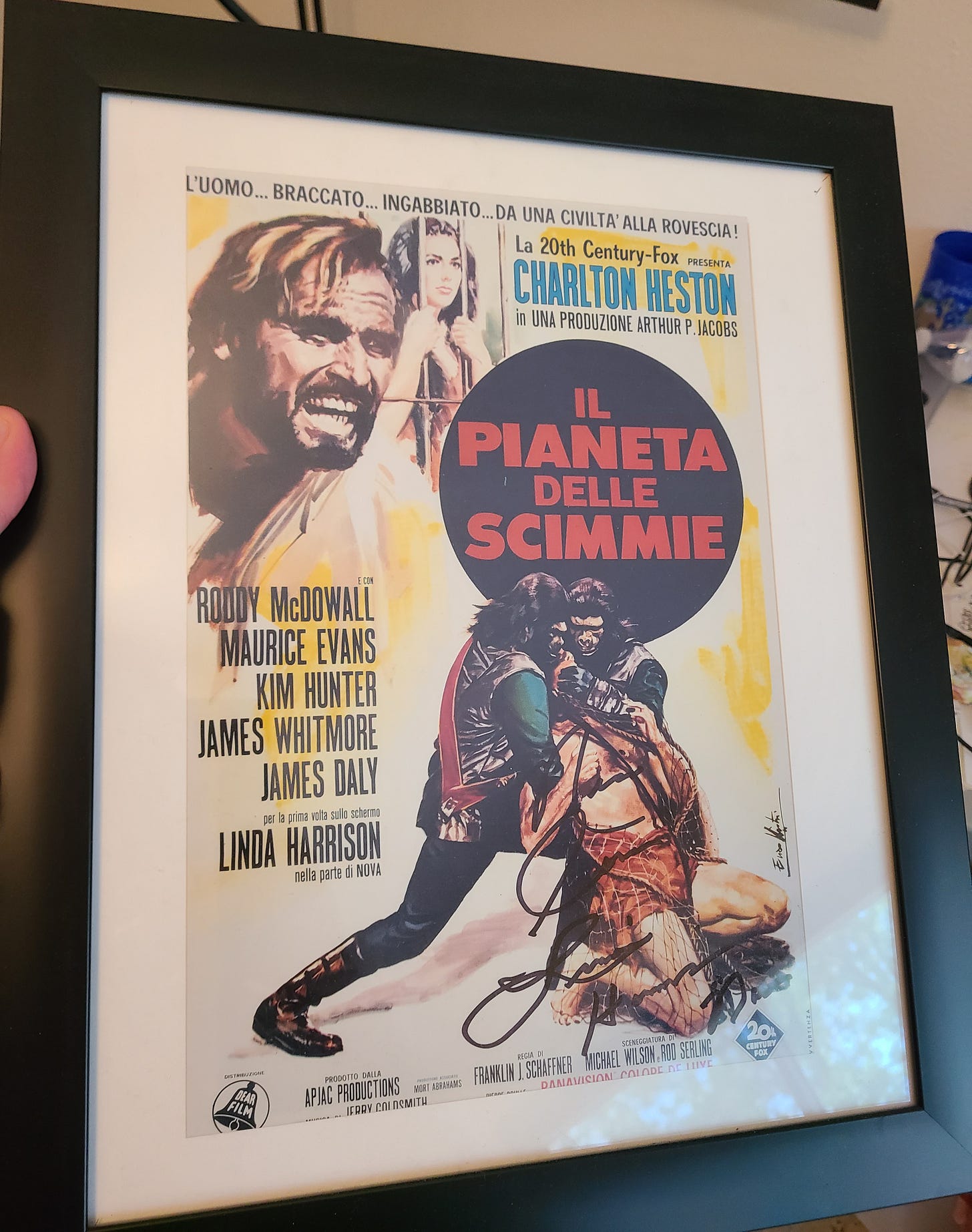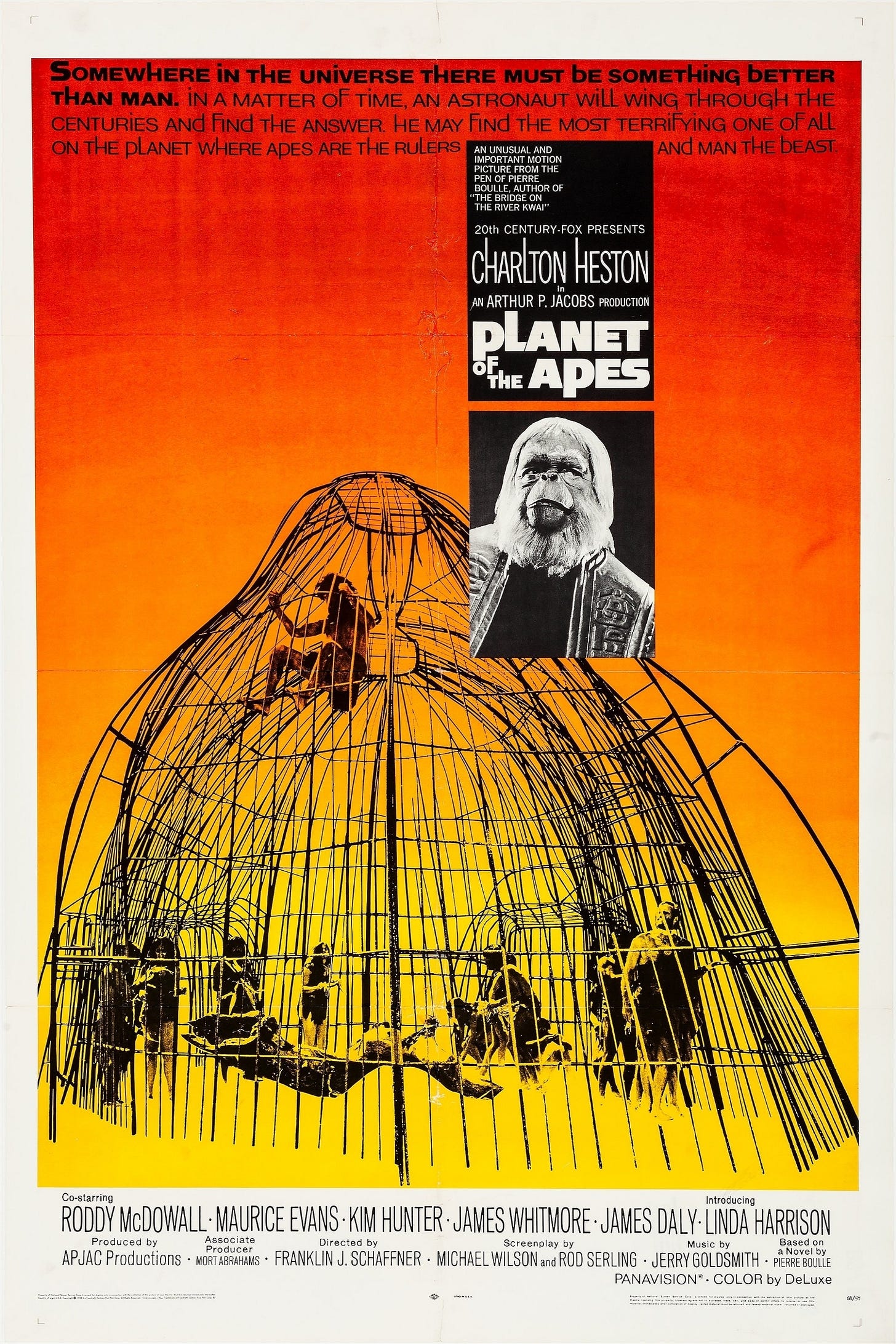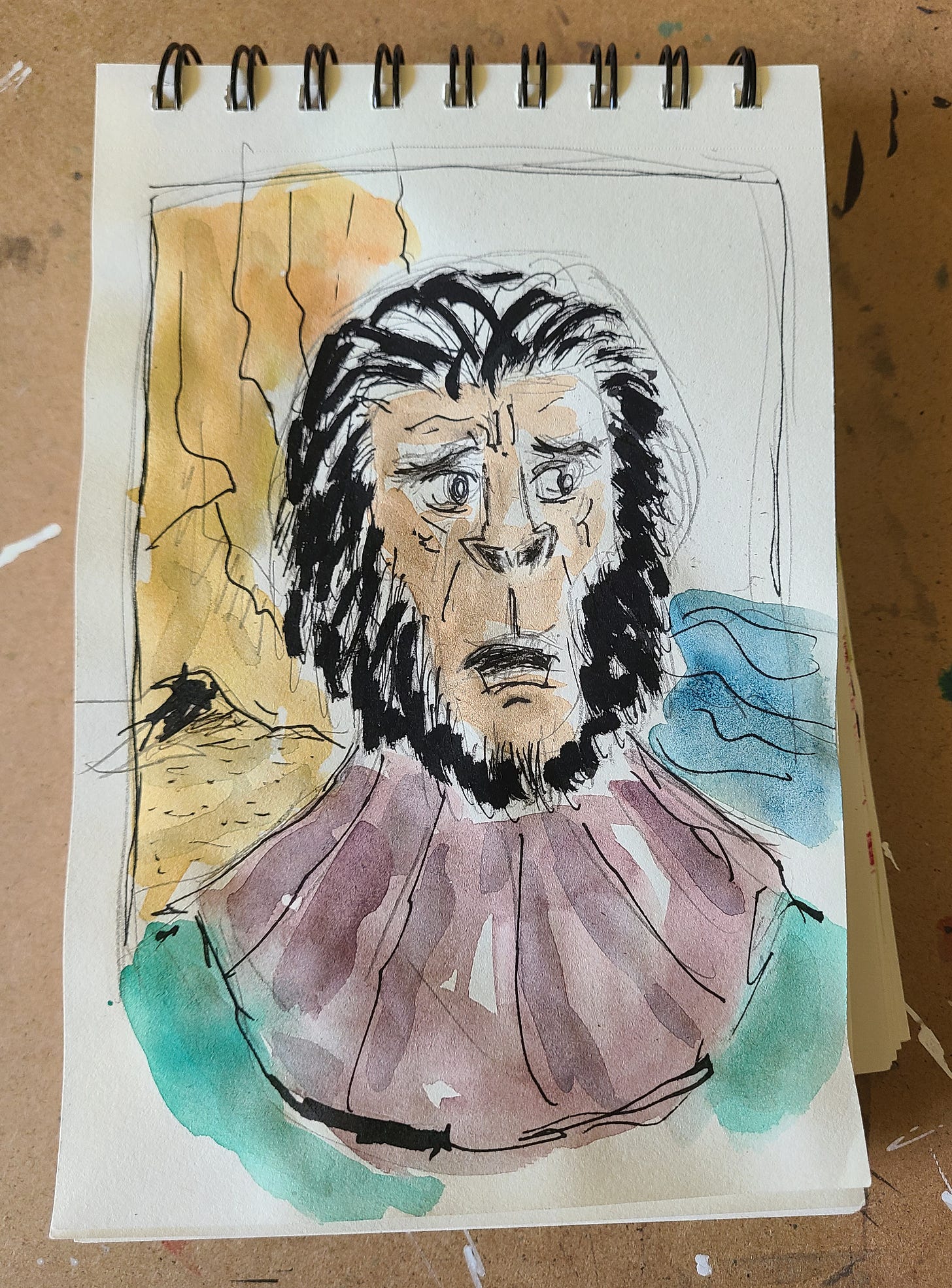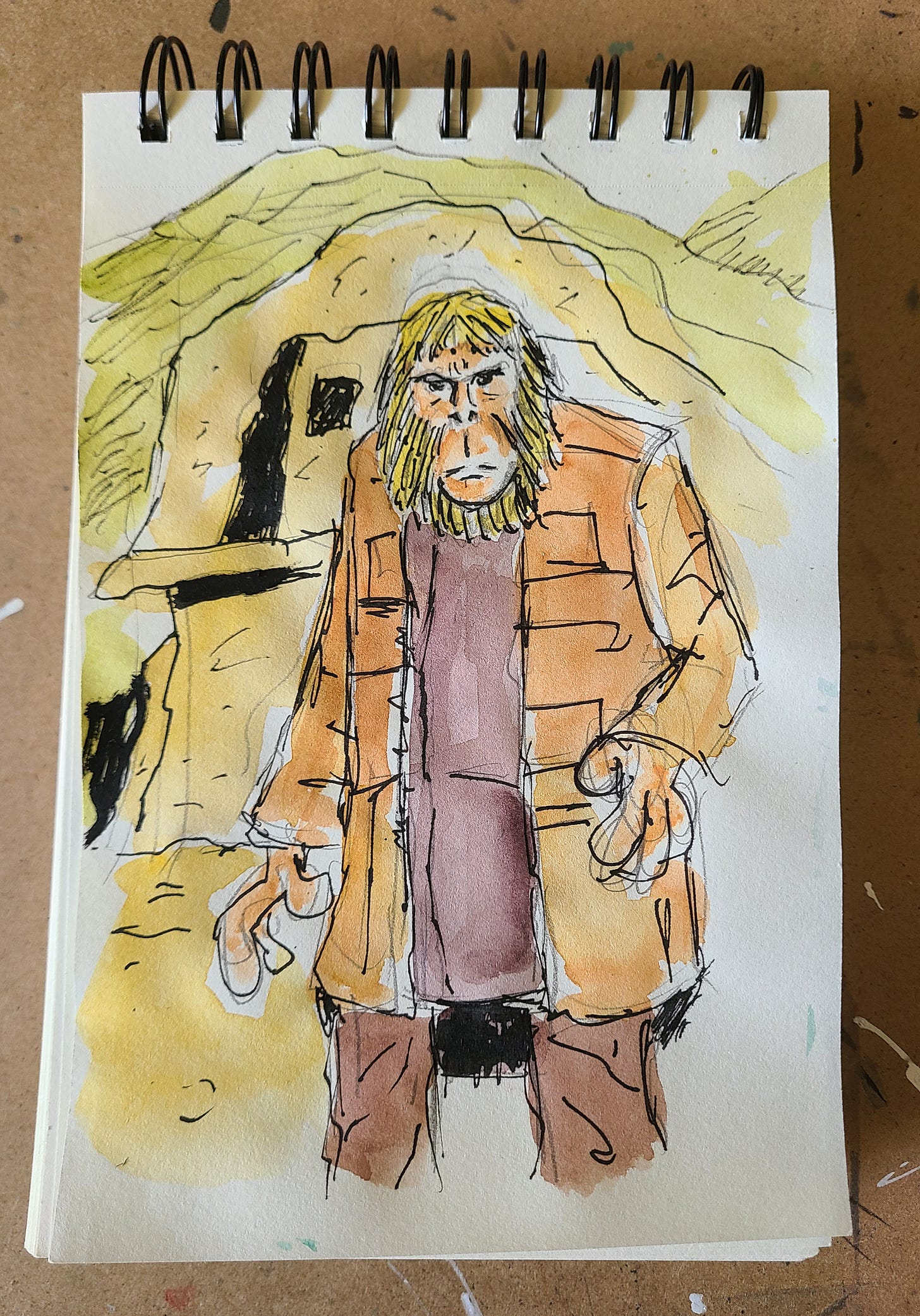The Apes Anomaly
Reflecting on my time with the Planet of the Apes
It’s 1999. Ten-year-old Nico sits in front of the TV screen with his jaw to the floor. The camera pans out until we see the Statue of Liberty towering over a murky beach. A devastated Charlton Heston falls to his knees. Kid Nico whispers to himself, “It was Earth…the whole time…the whole time.” A tear falls. Credits roll. End scene.
This, my dear friends, was the single greatest moment in my movie watching lifetime - the final scene of the 1968 sci-fi epic, Planet of the Apes.
I don’t think that another moment will ever come close. I was at the perfect age to at least somewhat understand the allegorical references, appreciate the ahead-of-its-time costume designs, and get lost in an otherworldly adventure. I thought that we were on a far, far away planet after the earthling astronauts had crash landed on a desert world. Nope. We were on Earth in the distant future, staring at our barren, man-made tragedy of a planet. My young brain just could not fathom what I had just watched. My mind was blown in the best way possible.
And thus, sparked my life-long Planet of the Apes fandom.
I am a 100% Beneath the Planet of the Apes apologist. Most casual fans despise this movie. I know that it is ridiculous, and maybe nonsensical at times, but oh-my-gosh does it go places. It takes some massive swings, including its end of movie destruction of the world scene. The rumor is that Charlton Heston wouldn’t come back for part two unless he was able to end the franchise himself so that he didn’t have to participate in Apes movies any longer. Back when sci-fi was for whimps. Look, this movie is metal, and people need to reappraise it.
One of the grandest things that Beneath did was pave way for perhaps my favorite Apes movie ever made, Escape from the Planet of the Apes. Just before Earth is destroyed at the end of Beneath, our heroes Zira and Cornelius hop in an escape pod and blast off in hopes of escaping the dreaded nuclear blast. They do getaway, but guess where they end up?
1973 America. Yeah, that’s right. They hit another intergalactic anomaly and are thrown into a good ol’ fashioned swap-a-roo. It is a GENIUS move. Human out of water? Now it’s Ape out of water. In Escape, we get to see how present-day humans react to the appearance of ape humanoids from the future. It essentially turns into a 70s comedy romp for 80% of the movie. The interplay between Zira and Cornelius is just magical. The scene where one of the humans offers Zira a banana and she looks at him with absolute disgust is one of the greatest jokes ever and immediately establishes the stakes. Zira is a sophisticated ape, and she’s far better than a demeaning banana that may not even exist on her home world. The end is darkly subversive, which is the perfect set up for Conquest of the Planet of the Apes.
Conquest is a complete changing of tone. The allegories of racism and civil rights are the driving forces of this film as the story begins on the cusp of the Apes revolution. We follow Caesar leading the effort to freedom in a tremendously grounded and impactful story. Conquest has one of my favorite Apes moments – Caesar’s roaring speech that ignites the rebellion. It’s a monumental scene.
Okay, I’ll admit, the fifth film, Battle for the Planet of the Apes, is pretty unremarkable and my least revisited flick out of the bunch. The expectations were high, but it unfortunately delivered a less than mediocre “battle” and resulted in a standard sci-fi flick of that era. I probably need to watch it a few more times, but it left a not-so-great impression. Hey, 4 out of 5 isn’t so bad.
All of this to say, if you haven’t watched the original Apes movies, you really should. Each of these movies has a grand vision, and they strive to make something special. That isn’t always the case, especially for many modern blockbusters that are simply chasing a big pay day. Sure, Apes did want to capitalize on the success of the first film, but each movie was nuanced and reflected a societal outlook just as much as it was entertaining.
We all know that the original Planet of the Apes is hailed as one of the greatest pieces of sci-fi cinema history, but I truly think that the rest of the classics (excluding Battle) have a lot to offer, both at surface and analytical levels. Don’t listen to the skeptics who disregard all of the movies after the first.

Time travel back to 25 years ago. Kid Nico is about to hit play on the Planet of the Apes VHS, which was fresh out of the 5-movie box set that his family got that year for Christmas. Little does he know, that simple press of a button will ignite the fuse of a lifelong passion for storytelling.
The movie begins and Astronaut George Taylor’s voice enters the cockpit.
“The earth has aged nearly 700 years since we left it,” Taylor says then puffs a cigar.
“But we’ve aged hardly at all...”
*Chef’s kiss*
Apes forever!
Next week, we dive into the greatest sci-fi movie of all time, Tim Burton’s PLANET OF THE APES!**
**100% sarcasm. Sorry, Marky Mark.
Thanks for your time,
Nico






I think I was with you when you watched that movie. Those movies never grow old on me. They were well written and had good actors. Your drawing of the ape General is impressive. Can’t wait for you to do some Clint Eastwood stuff! Best regards.
My wife just watched the original Apes for the first time, and she had no spoilers for the ending. She was just as floored as you were when you were ten. But I would love an in depth comparison of how you think the new ones compare to the old ones. I'm not a fan myself, but I'm never too far off from embracing a brand new fandom. Seeing Furiosa this summer has sparked an interest in re-watching all the Mad-Max movies again in chronological order just to feel the joy of being immersed into a world and feel the way Star Wars used to make me feel.